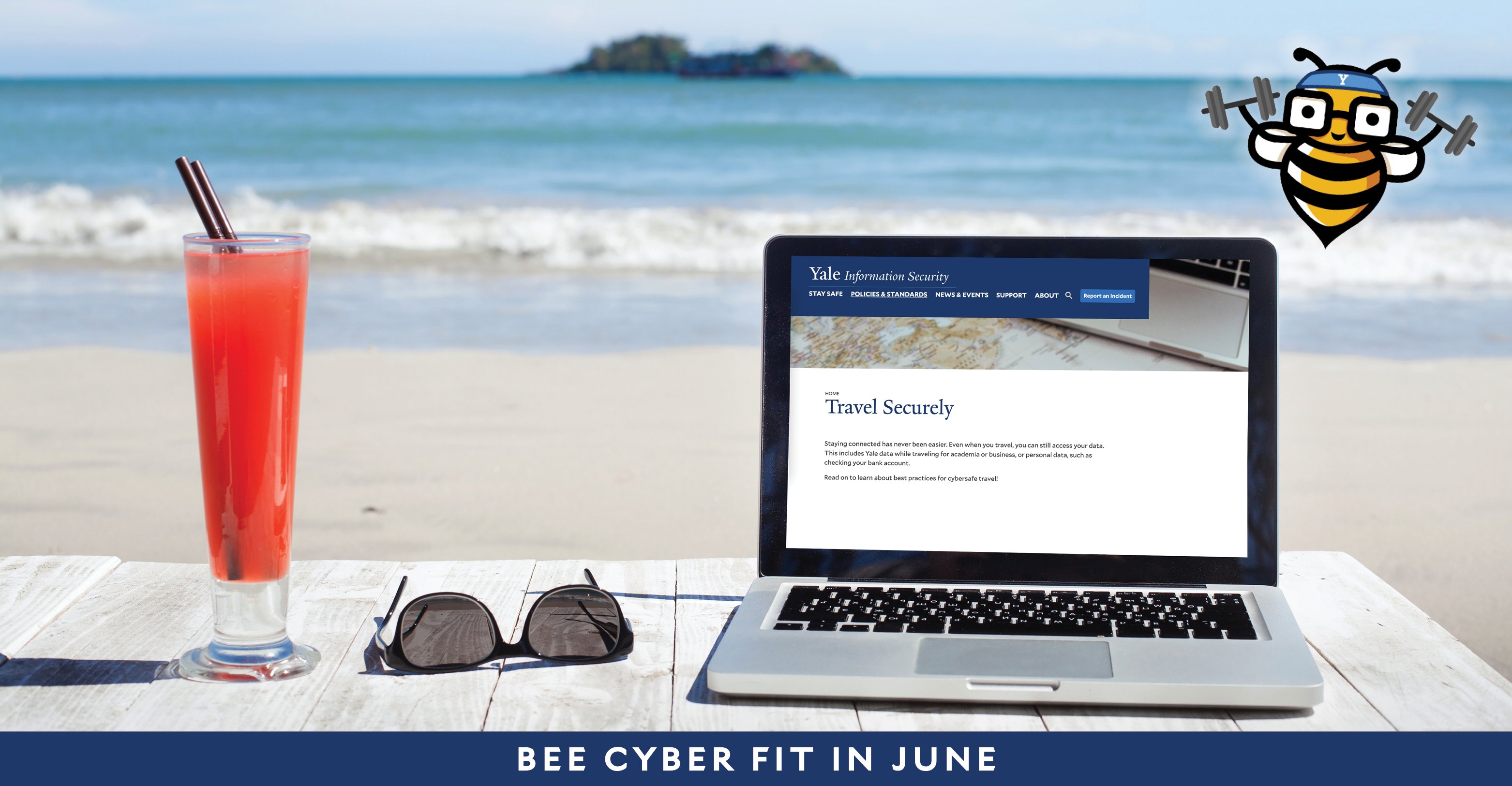
Summer can bring fun, relaxation, and travel to new places. But it also means we must strengthen our digital defenses.
According to recent studies, cybercrime costs the global economy more than $1 trillion annually, and travelers are often prime targets due to their reliance on public wifi and unfamiliar networks.
Are you prepared to protect yourself from cyber threats while on the go? Do you know how to protect both Yale’s and your personal devices when away? Whether traveling for business or pleasure this summer, strengthen your cyber defenses with our secure travel tips.
The problem
Cybercriminals find clever ways to compromise devices and extract sensitive information. Here are a few ways they can wreak havoc:
- Fake wifi spots in airports, hotels, and cafes can steal passwords and other sensitive data
- Unsecured devices left in hotel rooms can be stolen (or data extracted)
- Allowing someone to “use” your phone
- Screening devices at border control that take your information
With cybercrime rates on the rise, it's important to understand the risks and take proactive measures to safeguard your digital life.
The solution
Review these strategies to ensure you stay cyber-safe during your travels:
- Be wary of public wifi
- Why it matters: Public wifi networks are often unsecured, making it easy for hackers to intercept your data.
- Action step: Avoid accessing sensitive information, such as banking or work emails, over public wifi. If you must use public wifi, use a virtual private network (VPN) to encrypt your connection and protect your data from eavesdropping.
- Pay attention to your devices
- Why it matters: Cybercriminals are masters at distracting us. The less devices you have, the easier it is to keep them secure.
- Action step: Leave devices you don’t need at home or work. Never leave devices you have with you unattended. Power off your devices at airport security.
- Pay attention to your data
- Why it matters: We use our devices for everything. If traveling for business, many of us have access to Yale High and Moderate risk data. If traveling with your personal devices, consider what sensitive data may be on the device.
- Action step: Bring only the data you need. Store data in secure applications. If you need to travel with a USB or other storage device, ensure it is encrypted.
- Use strong and unique passwords
- Why it matters: Weak passwords are one of the easiest ways for cybercriminals to gain access to your accounts.
- Action step: Use a password manager to create and store strong, unique passwords for all your accounts. Enable two-factor authentication (2FA) wherever possible to add an extra layer of security.
- Keep software and systems updated
- Why it matters: Outdated software can have vulnerabilities that cybercriminals exploit.
- Action step: Regularly update your devices, applications, and security software to protect against known vulnerabilities. Enable automatic updates to ensure you’re always running the latest security patches.
By taking these precautions, you can significantly reduce your risk of falling victim to cybercrime while traveling. Here are two additional action steps to stay cyber-safe on your next trip:
- Back up your data: Before you leave, back up your important files to a secure cloud service or an external hard drive. This ensures you can recover your data if your device is lost or compromised.
- Be mindful of social engineering: Be cautious of unsolicited messages or emails asking for personal information. Cybercriminals often use phishing attacks to trick travelers into revealing sensitive data.
Staying cyber-safe while traveling requires vigilance and proactive measures. By following these tips, you can protect Yale’s and your data. Plus, you can enjoy your trip with greater peace of mind, knowing your digital life is secure.
More ways to build your cyber muscles!
- Curious about what happens when cybercriminals get a hold of your data? Register for Cyber Actors: Who Wants Your Data and Why on Tuesday, June 25 from 2:00-3:00 pm. Yale faculty member and former FBI agent Asha Rangappa will share the lowdown in this engaging talk.
- Put your cyber travel know-how to this test with our self-paced trivia game.
- Listen to the latest Bee Cyber Fit podcast episode, Behind the Lock Screen: Strategies for Device Defense & Cyber Resilience.
